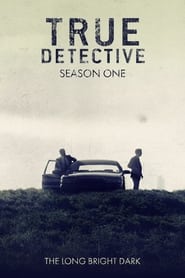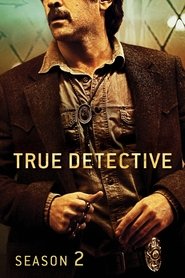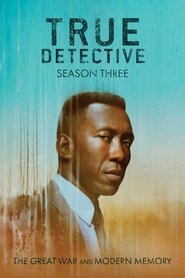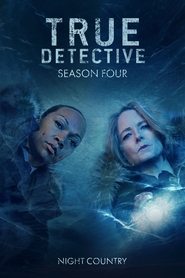Stephen Campbell
7
Reviewed by Bertaut
_**Thoughts on the third season**_
> _But about that day or hour no one knows, not even the angels in heaven, nor the Son, but only the Father._
- Matthew 24:36
> _Happy are those who can relieve suffering with prayer. Happy those who can rely on God to see them through. They can wait patiently for the end. But we who have put our faith in the goodness of man and now see man's image debas'd lower than the wolf or the hog – Where can we turn for consolation?_
- Paul Fussell; _The Great War and Modern Memory_ (1975)
> _If you are your life story, what are you without your memory?_
- Nic Pizzolatto
A murder mystery set in small-town southern America, focusing on a dedicated cop who drinks too much, letting the case burrow under his skin and destroy his personal life as he chases answers across multiple time periods. But underneath, it's about more than that – it's about personal demons, good and evil, the soul, American identity, memory, time. And as the case progresses, a conspiracy slowly comes into focus. There may even be a supernatural element. Thus was the first season of _True Detective_. And thus is the third. With one major difference – season one was ground-breaking, one of the finest seasons of TV ever made, a defining early example of prestige TV. Season three, on the other hand, is, well…put it this way, of all the shows I've ever seen, season three of _True Detective_ is one of them.
Okay, okay, I'm being flippant. But there's no denying the similarities between seasons one and three. Now, this is not necessarily a bad thing – I mean who would want a repeat of the horrendous and universally panned second season? So creator/writer/showrunner Nic Pizzolatto returning to his roots for the third outing is, on paper anyway, a good idea. The problem is that because this season is _so_ similar to season one, it's practically crying out for people to judge it in the light of those glorious episodes from 2014. And the contrast is not flattering.
This being _True Detective_, there is a lot to praise – the aesthetics are top-notch, the sense of place is palpable, the acting is off-the-chart brilliant. And there are some interesting themes – racial tension, journalistic ethics, marriage, fatherhood, the shadow of the Vietnam War, old age. But this being Pizzolatto unfettered, there's a lot to criticise too – the glacial pace, the under-written female roles, the cod-philosophy, the (toxic) machismo, the clichés, the dreadful finale. The fact is that Pizzolatto (a novelist by trade) needs an exceptional director to turn his ideas into something resembling brilliance, to imbue his relatively quotidian script with a portentousness well beyond the written word. He needs a director with a keen enough vision to mask the fact that his scripts are actually pretty by-the-numbers. Season three illustrates this beyond all doubt. Season one had the vision of Cary Joji Fukunaga (_Beasts of No Nation_, _Jane Eyre_, _Maniac_) who brilliantly directed all eight episodes, presenting a very thin story by way of such unforgettable and unsettling imagery that it made everything feel deeper and more profound than it really was. Season three has such a vision for two episodes; the first two, which are directed by Jeremy Saulnier (_Blue Ruin_, _Green Room_, _Hold the Dark_), who was also a showrunner until he abruptly departed after clashing with Pizzolatto (look out for a stunningly beautiful night-time shot of a search party walking through a field, torches moving in front of them – Sauliner gives the image a haunting fairy-tale-like quality). After these two episodes, directorial duties were split between Pizzolatto himself and journeyman TV director Daniel Sackheim. Season three without Saulnier (or Fukunaga) isn't as bad as season two, nowhere near, but it's still very weak, telling a threadbare story that it stretches out well beyond breaking point only to reward us with the limpest and most poorly written _dénouement_ you can possibly imagine.
The story is split over three time periods. In 1980, in the fictional backwater town of West Finger, Arkansas, eight-year-old Will Purcell (Phoenix Elkin) and his twelve-year-old sister Julie (Lena McCarthy) go out to play on their bikes and fail to return. When the police are alerted, the case lands on the desk of Wayne Hays (an insanely good Mahershala Ali), a tracker during the Vietnam War, and one of those guys whose mind never really made it home from the jungle, and his partner Roland West (a superb Stephen Dorff). The kids' parents, Tom (a scene-stealing Scoot McNairy) and Lucy (a wonderfully contemplable Mamie Gummer), who hate one another, insist the kids wouldn't run away, and not long into the investigation, they are proven correct. Shortly thereafter, Wayne meets and forms a bond with the kids' English teacher, Amelia Reardon (Carmen Ejogo), who has her own reasons for pursuing the case. Ten years later, in 1990, Hays (now married to Amelia and with two children of their own) is working a dead-end desk job and West is a lieutenant. In the same week that Amelia's book about the case is being published, unexpected evidence comes to light that changes everything. The Purcell case is reopened and West is placed in charge of a special task force to look into it. And then, in 2015, Hays, now a widower suffering from memory loss, begins recording an interview on the case for a true-crime TV show, pushed into doing so by semi-unscrupulous journalist Elisa Montgomery (Sarah Gadon). Talking about the case, however, stirs something in him, and he determines to finally solve the mystery once and for all.
As with the first season, the use of multiple timelines muddies the narrative waters in a manner that wouldn't be possible were the story being told chronologically – the jumping back and forward means that sometimes we have a lot more information than the characters (in relation to the 1980 and 1990 timeline, we are seeing events in their future), but sometimes we have considerably less (in 2015, there are aspects of the case that we aren't privy to, but which the characters know all about). Especially laudable is how the show handles the time jumps, employing a variety of methods that serve to collapse the three different periods into one another. So, for example, a question asked of Hays apparently in 1990 is actually a question he's being asked in 2015, with the sound bridging the picture edit; a streetlight going out in 1980 cuts to a key-light going out in Hays's 2015 interview; a shot of Hays looking through a window in 1980, shows a reflection of his 2015 persona; a single-shot scene in a car depicts the characters repeatedly changing from 1990 to 2015 every time their face is off-screen. It's really well done, and carries thematic significance insofar as memory, particularly its subjectivity, unreliability, and mutability, is one of the main issues being examined throughout the season.
Also laudable is the old-age make-up by Michael Marino (_I Am Legend_, _Black Swan_, _The Irishman_), which is some of the best I've ever seen, and is complemented by an exceptional performance from Ali. He plays Hays differently in each of the three timelines, and it gives the character a believable arc – in 1980, he's driven, confidant, imposing; in 1990, a sense of bitterness and indignation has crept in, he has a shorter temper and less tolerance for things of which he disapproves; in 2015, he's become a vulnerable and confused old man with just a hint of his past acerbity. It's a bravura performance from Ali, who really does carry the show on his shoulders. This is not to say the other performances are poor – Dorff is exceptional throughout, with his portrayal of West more uniform and unchanging than Ali's (which makes sense as West is more of a company man than Hays), and McNairy is heartbreaking in a somewhat thankless role (an interrogation scene in the sixth episode is worth looking out for). Ejogo is also excellent, although she's shackled by the poorly-written character she's playing, about whom Pizzolatto can't seem to make up his mind. Is she an exploitive opportunist or an empathetic journalist looking for the truth?
And aside from all this, there are some interesting thematic elements dotted throughout the show. Racial tension, for example, is never focused upon, but it's always in the margins, often unspoken. When Hays first meets Amelia (a black woman teaching white kids), he asks her "_how is it here?_", to which she replies, "_it's fine. It's good really, for what it is. I hear something now and then. They're all poor around here; that's the main thing_." Elsewhere, he refers to his "_redneck radar_" and points out to West that they belong to different _"tribes_". Later he queries if West's promotion was related to his "_pigmentation_" and in 2015, Elisa asks him if he ever felt he was being racially discriminated against during the investigations. In another scene, he snaps at a well-intentioned West, "_please explain to me the hardships and tribulations of being a white man in this country_". The most direct engagement with race occurs when Hays and West go to question a black man, and tensions quickly rise. Although West points out, "_we're not going to solve the racial complexities of our day in your front yard_", the man still asks Hays, "_how you gonna wear that badge?_" to which he replies, "_it's got a little clip-on_". If only Pizzolatto could be that incisive yet subtle more often.
So if the aesthetics are good and the themes are reasonably well-handled, why is season three a dud? Well, for a few reasons. As already mentioned, it moves at an agonisingly slow pace, and without the visual gymnastics of someone like Fukunaga or Saulnier, the story can't sustain itself – it's stretched way beyond breaking point, lapsing into repetition and narrative strands that go absolutely nowhere. I'm loathe to say it's boring, as I think that's too negative a term, but my God, this story could have been told very efficiently in five episodes, not the indulgent eight Pizzolatto has taken. And yes, I know, it's not really about the murder-mystery, it's about the characters. I get that, and I accept that, and I celebrate any film or TV show which puts character before plot, but the characters here aren't very interesting, and they do an awful lot of moaning. There's certainly no Rust Cohle (Matthew McConaughey) or Marty Hart (Woody Harrelson). Hell, there isn't even a Ray Velcoro (Colin Farrell). Hays is brilliantly played, but he's as dull as dish-water, and the 1990-set problems between himself and Amelia, which come to take up an increasing amount of screen-time, are so uninteresting and self-serving, they're difficult to watch (especially when we're watching them have the same argument for the third time). The point is that large sections of the season drag interminably because neither the central mystery nor the main characters are engaging enough to sustain such a slow-moving plot
And then there's the finale. Good Lord. Okay, the finale of season one was weak. It was the episode when Fukunaga's smoke and mirrors cleared and allowed us to see that at the season's core was the tale of a serial killer paedophile. The conspiracy went nowhere, the philosophical musings went nowhere, the supernatural hints went nowhere, and the mythology (the Yellow King, black stars, Carcosa) all boiled down to a psycho living in the swamps who liked having sex with and killing children. It didn't ruin the season, but it was underwhelming. Season three's finale is about five times worse. It's so badly structured and written that I genuinely do not understand how it made it to screen unless there's no one willing to tell Pizzolatto that something isn't a good idea. About three-quarters of the way through the episode, with most of the season's questions still open, a character quite literally sits down and explains everything (and I mean everything). He walks us through every single event and answers almost every single question. It's horrid writing. To hell with the cardinal rule of writing for film or TV, "show, don't tell"; here we have a finale with a 10-minute exposition dump right at its heart, which literally tells without showing. I don't know of a single criterion by which one can judge that decision a sound one. The last episode is insultingly bad.
Despite disliking two of the three seasons of _True Detective_, I still consider myself a fan (the first season was that good). But it's starting to look more and more like that first season magic had more to do with the director than the writer. Pizzolatto just doesn't have a unique enough vision to raise the show above the competition, not when he's allowed creative _carte blanche_ anyway. Much like the first season, the mystery at the heart of season three was never as complicated nor as awe-inspiring as it initially seemed, but unlike season one, season three doesn't give us much else to latch onto. The story Pizzolatto is telling and the characters who inhabit it are too weak to support eight hours of narrative architecture. And, by God, that ending really annoyed me!
Season rating: 2.5/5




